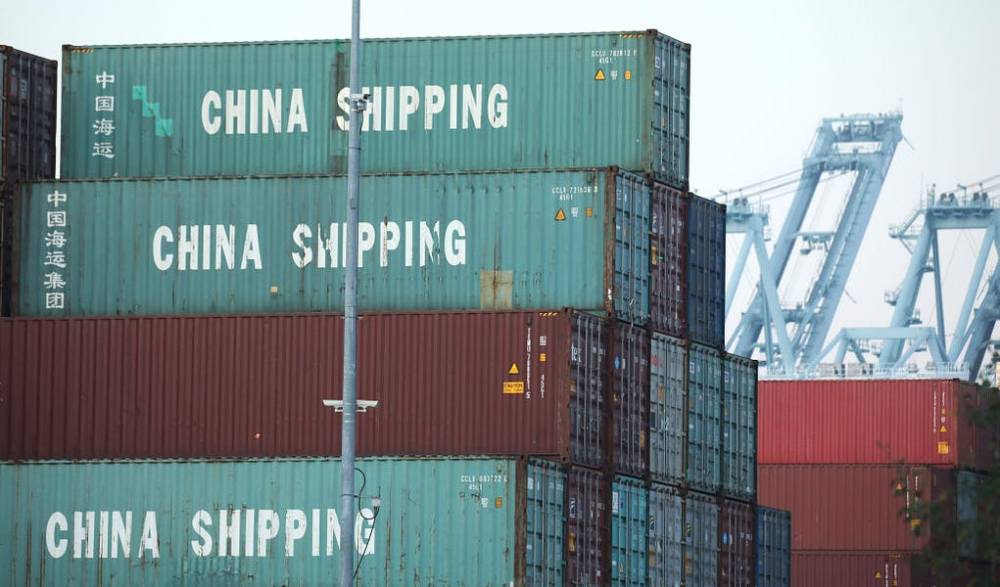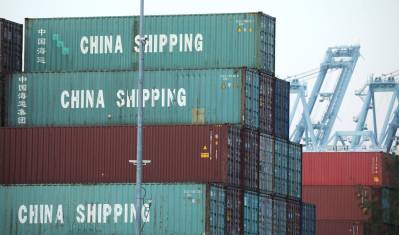Hello from Capitol Hill, where lawmakers have a lot on their minds this week, including but not limited to an encroaching government funding deadline, an upcoming Supreme Court confirmation effort, and a bipartisan effort to reform the Electoral Count Act.
They’ll also be debating a sweeping China competition bill that could have a big impact on American businesses.
Lawmakers Reconsider Benefits for Chinese Shipments
Members of Congress are debating increasingly creative strategies to undercut the Chinese government amid its genocide of ethnic minorities and destructive behavior on the global stage.
The House will vote this week on a behemoth China competition package, including provisions to boost American industries and to target Chinese officials for their brutal human rights abuses. But also tucked into the measure is a section that would bring the tensions closer to American consumers’ doorsteps: further tariffs on shipments from China. The change could impact hundreds of millions of packages each year, touching both finished goods and industries that source smaller components from China.
House Democrats’ bill would weaponize America’s broad duties exemption for imports worth less than $800. International shipments beneath what is known as the de minimis threshold are not currently subject to tariffs—partly because the administrative costs of collecting such fees often outweigh the fees collected.
The rules are also intended to help American consumers, enabling lower prices and faster shipping on their purchases. The United States has a generous de minimis level compared to most other countries, which is a boon to e-commerce and shipping companies.
Drawing from Rep. Earl Blumenauer’s similar legislation, the provisions in Democrats’ China competition package would expose shipments from China to additional fees and processing. Blumenauer has raised concerns that Chinese companies, which are more likely to use forced labor and rely on intellectual property theft, are using smaller shipments beneath the de minimis threshold to circumvent scrutiny from customs authorities.
It is unclear at this point if the plan could make it into a final bill negotiated between the two chambers. The provisions were not included in the version the Senate approved last year. Several House GOP aides pushed back on eliminating de minimis for China in the competition package last week, suggesting it may be something to consider at a later time. But momentum to scrap or reform the de minimis threshold for imports from China is building among longtime protectionists and foreign policy hawks.
Even some staunch supporters of a high de minimis threshold are saying Congress might need to rethink the rules.
Sen. Chuck Grassley, currently the top Republican on the Judiciary Committee and previously chairman of the Finance Committee, put it this way on Monday night when asked about the provisions by my colleague Audrey Fahlberg: “Small business benefits a great deal from that. And I don't want to do anything to hurt small business, but quite frankly, I think something ought to be changed. But I’ve got to think it through.”
The proposal’s inclusion in the legislation—and the fact that some key Republicans haven’t yet rejected it outright—signals a new era of policy making when it comes to China. While the interests of the business community remain top of mind for many lawmakers, Congress has shown a willingness to run against those interests in addressing China’s human rights abuses, as evidenced by the recent overwhelming passage of the Uyghur Forced Labor Prevention Act despite the fire it received behind the scenes from large corporations and administration officials who claimed it was too strict.
In 2015, lawmakers raised the de minimis threshold from $200 to $800, a victory for smaller online retailers who would enjoy faster shipping and lower costs as a result. It wasn’t the end of the conversation: Some domestic industries that face steeper competition from foreign products under the rules have continually called for Congress to reverse course. Others have pointed out that America’s trading partners don’t have nearly as generous rules for products going into their countries from the United States.
During the Trump administration, former U.S. Trade Representative Robert Lighthizer negotiated higher de minimis thresholds for American shipments to Canada and Mexico. Still, those thresholds remained much lower than the United States’ level. In pursuit of a more reciprocal relationship, Lighthizer later considered a route to lower America’s de minimis threshold for shipments from Mexico and Canada. Grassley, along with the top Democrat on the Finance Committee Sen. Ron Wyden, pushed against the idea.
The $800 threshold, they wrote, “benefits thousands of American small businesses across all sectors, as well as our manufacturers that rely on imported low-value inputs for the production of U.S. exports.”
“Our higher threshold has helped to make the United States a leader in global e-commerce—a position that we should not cede to countries, like China, that are vying for that role,” Grassley and Wyden said.
Asked about Blumenauer’s proposal on Monday night, Wyden said he is “going to talk to my colleagues before I start making changes.”
In earlier times, a plan to end or reduce the benefits for shipments from China might have sparked a public lobbying effort by shipping companies like UPS and FedEx, as well as online marketplaces. And that could still happen in this case—but thus far, the conversations have happened largely behind the scenes.
A person familiar with the effort told The Dispatch that a group of business associations has met with lawmakers and Hill staff since late 2021 to urge against changes to the de minimis threshold. Their argument to members of the Ways and Means Committee from both parties is that now, with an economy facing high inflation and supply chain challenges, is not a good time to approve a change that could cause higher costs and potential shipping delays for many products. An aide to a Democratic member of the panel confirmed conversations with business groups on the issue had been taking place.
Economist Gary Hufbauer, a senior fellow with the pro-free trade Peterson Institute for International Economics, shared that sentiment.
“I see where Blumenauer is coming from because everyone wants to pile on China right now,” Hufbauer told The Dispatch. “The result, in my view, will be to pile on U.S. consumers and small firms.”
Although not directly related to China like the de minimis changes, Democrats are eyeing similar action with the Generalized System of Preferences, a program to help less developed countries by scrapping tariffs on many products. In recent years, some members of Congress have urged more stringent eligibility requirements for the program. House Democrats included language in their China competition bill imposing higher standards for worker treatment and environmental conditions.
GOP lawmakers have broadly criticized the House China bill’s trade provisions. The package is not expected to receive much Republican support when it comes forward this week, on account of a slew of other priorities Democrats added. Texas Rep. Kevin Brady, the top Republican on the Ways and Means Committee, said last week that it is a “highly partisan bill stuffed with more Washington control over the economy and ideological pandering to Democrats’ political base.”
He also recently pushed back on Blumenauer’s de minimis legislation. “I’m not convinced that de minimis is a loophole to our trade laws,” Brady said, according to a spokesman. He added that Blumenauer’s concerns are held in good faith, though, and “I’m happy to continue to learn more about his bill.”
Blumenauer, who was one of 24 House Democrats to support the bill in 2015 that raised the threshold to $800, has pointed to an increase in shipments coming into the United States. As noted by Roll Call’s Ellyn Ferguson, air cargo and truck transport shipments worth $800 or less increased by 219 percent and 123 percent, respectively, in fiscal year 2020.
Customs and Border Protection data shows that America took in 771.5 million de minimis shipments over the course of fiscal year 2021. That adds up to more than 2 million shipments each day.
“As long as foreign companies that sell their goods in America are splitting up their shipments to evade tariffs and oversight, American businesses will continue to be put at a competitive disadvantage cost-wise,” Blumenauer said.
On the Floor
The House is set to consider Democrats’ sprawling China competition bill this week. Members are also likely to vote on legislation calling for sanctions on foreigners responsible for human rights violations on account of sexual orientation or gender identity. The measure is unlikely to receive support from Republicans, who argue it would undermine religious freedom. Text of the measure is available here.
Meanwhile, it’s a thrilling week for those of us who relish post office renaming bills. The House is expected to take up 10 resolutions to name post offices around the country after notable people. A full list of bills scheduled for consideration in the House this week is available here.
The Senate has a slate of judicial and executive nominees ready for confirmation votes this week.
Key Hearings
Commerce Secretary Gina Raimondo will appear before the Senate Appropriations Committee at 2:30 p.m. today to discuss broadband access. Information and livestream here.
The Commission on Security and Cooperation in Europe will hold a hearing Wednesday at 2:30 p.m. about Russia’s assault on Ukraine. Information and livestream here.
The House Homeland Security Committee will meet tomorrow at 10 a.m. to examine the terrorism landscape. Information and livestream here.
The House Financial Services Committee is slated to meet tomorrow morning on homelessness in America. Information and livestream here.
A House Transportation and Infrastructure subcommittee will meet tomorrow morning for a hearing on the future of automated vehicles. Information and livestream here.






Please note that we at The Dispatch hold ourselves, our work, and our commenters to a higher standard than other places on the internet. We welcome comments that foster genuine debate or discussion—including comments critical of us or our work—but responses that include ad hominem attacks on fellow Dispatch members or are intended to stoke fear and anger may be moderated.
With your membership, you only have the ability to comment on The Morning Dispatch articles. Consider upgrading to join the conversation everywhere.